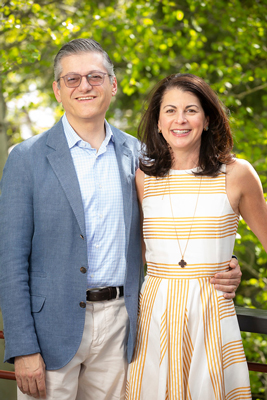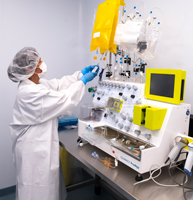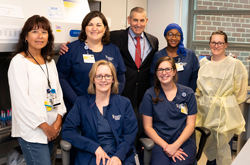 When physicians at a community hospital told Doug Becker that nothing could be done to treat his father’s lymphoma, he and his family promptly sought another opinion.
When physicians at a community hospital told Doug Becker that nothing could be done to treat his father’s lymphoma, he and his family promptly sought another opinion.
Doug has spent most of his life taking chances on new and innovative ideas. His steadfast determination led him to establish and lead some of the world’s most prominent education companies, including Laureate Education, Sylvan Learning Systems, and most recently, Cintana Education. The same ambitious mindset applied to finding the right care team to treat his father’s cancer.
Doug reached out to Dr. Curt Civin, a family friend and pediatric oncologist who is the Associate Dean for Research at the University of Maryland School of Medicine and founding Director of the University of Maryland’s Center for Stem Cell Biology & Regenerative Medicine. Dr. Civin directed Doug and his family to the University of Maryland Marlene and Stewart Greenebaum Comprehensive Cancer Center (UMGCCC).
“I always tell people that when you have a major league problem, you should go to a major league team,” Dr. Civin says. “When you have a lymphoma and go to a major league hospital, you don’t just see an oncologist who treats all kinds of cancers, but you see an oncologist who treats only blood cancers or even one who specializes in lymphomas. They will be very conversant in the latest therapies.”
Dr. Civin recommended specifically that Doug and his family meet with Dr. Aaron Rapoport, director of the Blood and Marrow Transplantation Program and co-leader of the Tumor Immunology & Immunotherapy Research Programs at UMGCCC. Dr. Rapoport is not only an expert in blood cancers, but his research is focused on creating the next generation of cell therapies for advanced and resistant forms of lymphoma and leukemia. Dr. Rapoport’s background and extensive knowledge about blood cancers gave Doug and his family hope.
“Dr. Rapoport thought he could help my father,” Doug says, “and his approach was, ‘we are at least going to try.’”
Doug’s father responded positively to Dr. Rapoport’s treatment plan and lived for five more years. He sadly passed away on June 4, 2021. The Becker family attributes the additional years to Dr. Rapoport and the comprehensive care team at UMGCCC.
“We feel the care that my father received was extraordinary,” Doug says. “The doctors and nurses were personal and direct, and the hospital staff was outstanding as well. We couldn’t have asked for a better outcome.”
During his father’s cancer treatment, Doug became interested in learning more about Dr. Rapoport’s innovative cell therapy research. In recent years, immunotherapy has emerged as a promising treatment for certain types of cancer. A patient’s own immune cells, or T-cells, can be genetically engineered to find and attack the patient’s cancer cells.
 Since 1998, Dr. Rapoport has led six major clinical trials of adoptive T-cell therapy with more than 150 patients. One of his most promising clinical trials showed significant success in treating patients with multiple myeloma.
Since 1998, Dr. Rapoport has led six major clinical trials of adoptive T-cell therapy with more than 150 patients. One of his most promising clinical trials showed significant success in treating patients with multiple myeloma.
Dr. Rapoport’s focus is now on other types of blood cancers, including lymphoma and leukemia. He and his team are developing the next generation of chimeric antigen receptor (CAR)-T cell therapy using a tagged antibody approach, which was invented at the University of Maryland. These CAR-T cells are more versatile because they can attack the patient’s cancer based on more than one protein displayed by the cancer, an approach that addresses cancer variants that are resistant to current CAR-T cells that can attack only one cancer protein. The clinical trial testing these next generation CAR-T cells will be the first-in-human studies using this approach. Another major focus is the development of a new CAR-T therapy for multiple myeloma and other blood cancers which was invented by Drs. Djordje Atanackovic and Tim Luetkens, two world-renowned cancer immunologists who recently joined UMGCCC.
“This research is very cutting-edge. It’s next generation, but there isn’t a lot of funding available for next generation CAR-T products,” Dr. Rapoport explains. “We are treating patients with a very advanced and resistant disease who have no other options for treatment. There is an enormous need for new CAR-T products, and we want to expand the diseases that can be treated with it—not only across the spectrum of blood cancers, but also to solid tumors, such as lung and breast cancers.”
Clinical trials are expensive to conduct. Major pharmaceutical companies typically will not invest until the drug or therapy is proven safe and effective—a process that can take several years to achieve. Philanthropic support is essential, especially in the early stages of a trial.
“Philanthropy not only helps us sustain our ability to hire, train, and retain highly-skilled personnel to make these products, but it is necessary to conduct the clinical studies that are needed to prove safety and efficacy,” explains Dr. Rapoport. “It takes a lot of money and resources to do these technically advanced studies, but if you look at the potential payoff, it’s really enormous.”
 Doug’s esteem for Dr. Rapoport is matched by his confidence in the next generation of CAR-T cell therapy. He was so impressed by Dr. Rapoport’s research that he and his wife, Erin, alongside Doug’s associated corporate foundation made a philanthropic gift to establish the Becker Family and Sylvan/Laureate Foundation Fund to Combat Hematologic Cancers.
Doug’s esteem for Dr. Rapoport is matched by his confidence in the next generation of CAR-T cell therapy. He was so impressed by Dr. Rapoport’s research that he and his wife, Erin, alongside Doug’s associated corporate foundation made a philanthropic gift to establish the Becker Family and Sylvan/Laureate Foundation Fund to Combat Hematologic Cancers.
“I am personally indebted to Dr. Rapoport for the lifesaving care that he provided to my father,” Doug says. “I hope that others will be as inspired as I was to give.”
A Baltimore native, Doug credits his parents for teaching him and his brother the value of philanthropy and the importance of giving back to the community. It is a powerful tool that can make an incredible and far-reaching impact.
“We’re living in an unequal society and finding solutions is not easy,” Doug says. “Our government can do so much, but it’s never enough. I see private philanthropy as a catalyst for innovation and a bridge between government response and vast unmet needs—and it’s so inspiring to me.”